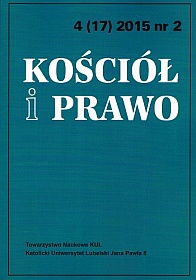The Meaning of Propedeutic Period in the Formation of Candidates for Priesthood
Abstract
The aim of the article is to show the role of propedeutic period in the particular Church, in the formation of candidates for priesthood. The propedeutic period is a response to the decision of the Fathers of Vatican Council to seminary formation adapted to the needs of the particular Church. Pastores dabo vobis shows the need for this period. The information document of Congregation for Catholic Education seems to show existing models and inspire new research. The main task of the propedeutic period is to compensate for shortcomings of spiritual, human and intellectual formation. Due to the diversity of spiritual and psychological needs of particular churches the legislature offers freedom of organize leaves it at the discretion of the diocesan bishop. Polish Bishops' Conference recognized the need for this period in all Polish dioceses and identified its basic tasks, and entrusted their implementation into the hands as the diocesan bishop to carry out.
References
Biskup, Marian. 1995. „Annus propedeuticus w formacji seminaryjnej – eksperyment czy konieczność?.” Ateneum Kapłańskie 3(505), nr 85(120): 470-474.
Góralski, Wojciech. „Współistnienie i współdziałanie wydziałów teologicznych i wyższych seminariów duchownych.” W Polskie Seminaria Duchowne na początku nowego tysiąclecia. Zagadnienia wybrane, red. K. Pawlina, 63-95. Warszawa: Drukarnia Loretańska.
Krukowski, Józef. 2005. „Święci szafarze, czyli duchowni.” W: Komentarz do Kodeksu Prawa Kanonicznego, t. II/1: Księga II. Lud Boży. Część I. Wierni chrześcijanie. Część II. Ustrój hierarchiczny, red. J. Krukowski, 54-117. Poznań: Pallottinum.
Molano, Eduardo. 2011. „Osoby prawne.” W Codex Iuris Canonici. Kodeks Prawa Kanonicznego. Komentarz. Powszechne i partykularne ustawodawstwo Kościoła katolickiego. Podstawowe akty polskiego prawa wyznaniowego, red. Piotr Majer, edycja polska na podstawie wydania hiszpańskiego, 137-146. Kraków: Wolters Kluwer Polska.
Pawlina, Krzysztof. 2002. Kandydaci do kapłaństwa trzeciego tysiąclecia. Warszawa: Wydawnictwo Sióstr Loretanek.
Pawluk, Tadeusz. 1985. „Wychowanie duszpasterskie w seminariach duchownych w świetle nowego Kodeksu Prawa Kanonicznego.” Prawo Kanoniczne 28, nr 1-2:61-72.
Rincón-Pérez, Tomás. 2011. „Święci szafarze, czyli duchowni.” W Codex Iuris Canonici. Kodeks Prawa Kanonicznego. Komentarz. Powszechne i partykularne ustawodawstwo Kościoła katolickiego. Podstawowe akty polskiego prawa wyznaniowego, red. Piotr Majer, edycja polska na podstawie wydania hiszpańskiego, 223-274. Kraków: Wolters Kluwer Polska.
Selejdak, Ryszard. 1998. „Koncepcja okresu propedeutycznego w świetle najnowszego dokumentu Kongregacji Wychowania Katolickiego.” Niedziela. Dodatek Akademicki seria T, nr 14:II-IV.
Selejdak, Ryszard. 2013. Stawać się i być kapłanem Chrystusa. Częstochowa: Kuria Metropolitalna–Tygodnik Katolicki „Niedziela”.
Sobański, Remigiusz. 2003. „Osoby fizyczne i prawne.” W Komentarz do Kodeksu Prawa Kanonicznego, t. I: Księga I. Normy ogólne, red. Józef Krukowski, 163-201. Poznań Pallottinum.
Copyright (c) 2015 Kościół i Prawo

This work is licensed under a Creative Commons Attribution-NonCommercial-NoDerivatives 4.0 International License.





